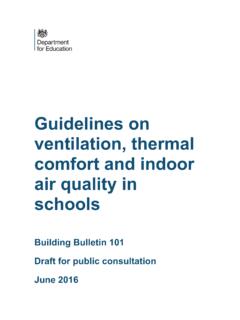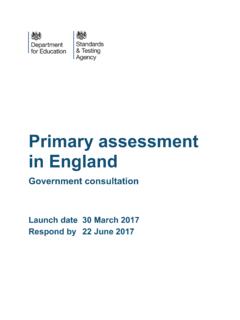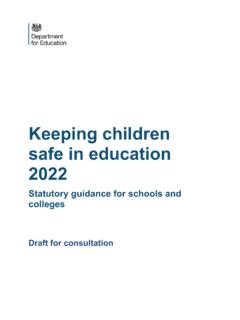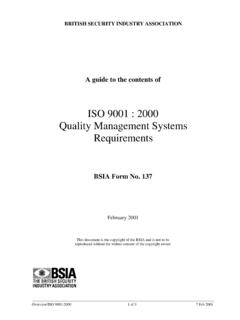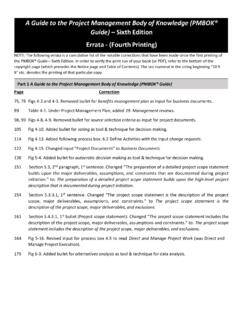Transcription of Suspension and permanent exclusion guidance
1 Suspension and permanent exclusion from maintained schools, academies and pupil referral units in England, including pupil movement guidance for maintained schools, academies, and pupil referral units in England January 2022 2 Contents Contents 2 Part one: About this guidance 3 Part two: What has changed in this edition? 7 Part three: The headteacher s power to suspend or permanently exclude for headteachers, academy principals and teachers in charge of pupil referral units 10 Part four: Factors to consider before making a decision to exclude 17 Part five: The headteacher s duty to inform parties about an exclusion 23 Part six: The governing board s and local authority s duties to arrange education for excluded pupils 29 Part seven: The governing board s duty to consider an exclusion 31 Part eight: The governing board s duty to remove a permanently excluded pupil s name from the school register 42 Part nine.
2 The local authority s/academy trust s duty to arrange an independent review panel 45 Part ten: The roles of independent review panel members, the clerk, the SEN expert, the social worker, and the Virtual School Head in the conduct of an independent review 54 Part eleven: The governing board s duty to reconsider reinstatement following a review 61 Part twelve: The local authority s role in overseeing the financial readjustment/payment 63 Part thirteen: Statutory guidance to the headteacher, governing board and independent review panel members on police involvement and parallel criminal proceedings 65 Annex A: Further information 67 3 Part one: About this guidance Aim Good behaviour in schools is essential to ensure that all pupils can benefit from the opportunities provided by education.
3 Therefore, the government recognises that school exclusions, managed moves and off-site direction are essential behaviour management tools for headteachers and can be used to establish high standards of behaviour in schools and maintain the safety of school communities. For the vast majority of pupils, suspensions and permanent exclusions may not be necessary, and their behaviour can be managed by other strategies. However, if approaches towards behaviour management have been exhausted, then suspensions and permanent exclusions will sometimes be necessary as a last resort. This is to ensure that pupils are protected from disruption and can learn in safe, calm, and supportive environments.
4 Schools and local authorities should not adopt a no exclusion policy as an end in itself. This can lead to perverse incentives to schools not to exclude even when exclusion is the only real way to make sure an excluded pupil can get the support they need, while remaining engaged in education. In some cases, a no exclusion policy can even present safeguarding issues and expose staff and pupils to unreasonable risks. Instead, schools and local authorities should work to create environments where school exclusions are not necessary because pupil behaviour does not require it. It is important to note that this guidance has been updated to be a companion piece to the Behaviour in Schools guidance , which provides advice to headteachers, trust leaders and school staff on implementing a behaviour policy which creates a school culture with high expectations of behaviour.
5 Therefore, this guidance should only be necessary when strategies, practices and interventions set out within the Behaviour in Schools guidance have not been successful in improving a pupil s behaviour or the use of more significant interventions or sanctions are required. It is important to note that this document from the Department for Education provides a guide to the legislation that governs the Suspension and permanent exclusion of pupils1 from all maintained schools (including special schools), pupil referral units (PRUs), academy schools (including free schools, special schools, studio schools and university technology colleges) and alternative provision academies (including alternative provision 1 A pupil is a person for whom education is provided at a school (section 3 of the Education Act 1996).)
6 There are three exceptions: A) if the person is aged 19+ and the education being provided for them at the school is further education. B) If the education being provided for the person is part-time education suitable to the requirements of people who are over compulsory school age. C) If the school is a maintained school and the education being provided for the person is being provided under section 27 of the Education Act 2002. 4 free schools) in England. It also includes the use of behaviour strategies such as managed moves and directing pupils off-site to improve behaviour to help prevent a Suspension or permanent exclusion . The document also provides statutory guidance to which headteachers, governing boards, local authorities, academy trusts, independent review panel members and special educational needs (SEN) experts must have regard when carrying out their functions in relation to Suspension and permanent exclusions.
7 Clerks to independent review panels must also be well-versed in this guidance . Where relevant, this document refers to other guidance in areas such as behaviour, safeguarding, SEN and equality, but is not intended to provide detailed guidance on these issues. This document replaces the version published in 2017 for schools in England. Review date This guidance will be kept under review and updated as necessary. Terminology The term must refers to what headteachers/governing boards/academy trusts/local authorities/parents and others are required to do by law. The term should refers to recommendations for good practice as mentioned in the suspensions and permanent exclusions guidance .
8 The definition of suspend in this guidance is what is described in the legislation as an exclusion for a fixed period. The term headteacher in this document means the headteacher of a maintained school, the teacher in charge at a PRU and the principal of an academy. The term governing board means the governing body of a maintained school, the management committee of a PRU and academy trust. The definition of a parent can be found in the Education Act 1996, and this applies to all the legislation to which this guidance relates. In addition to the child's birth parents, references to parents in this guidance include any person who has parental responsibility (which includes the local authority where it has a care order in respect of the child) and any person (for example, a foster carer) who has care of the child.
9 To reflect this, this guidance uses parent to refer to both parents and carers. Where practical, all those with parental responsibility should be involved in the suspensions and permanent exclusions process. [Placeholder: to signpost 5 separate guidance for parents on exclusion ]. Obligations are to the relevant person a parent or the pupil, aged 18 or over. Legislation on Suspension and permanent exclusion gives clarity and certainty to schools, local authorities, academy trusts and review panels on how to discharge their obligations to parents or pupils if they are aged 18 or over. Alternative Provision (AP) refers to suitable full-time education that is arranged for a pupil from the sixth school day (or earlier) of a Suspension or from the sixth school day (or earlier) after the first day of a permanent exclusion .
10 In other circumstances, AP may refer to education arranged for pupils who are unable to attend mainstream or special school and who are not educated at home, whether for behavioural, health, or other reasons. AP includes Pupil Referral Units (PRUs), AP academies and free schools, and hospital schools, as well as a variety of independent, registered, unregistered and further education settings. Academic year means a school s academic year beginning with the first day of school after 31 July and ending with the first day of school after the following 31 July. Where a school s academic year consists of three terms or fewer, a reference to a term in this guidance means one of those terms.

